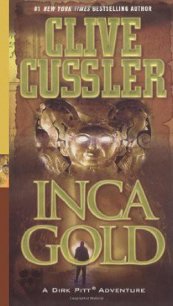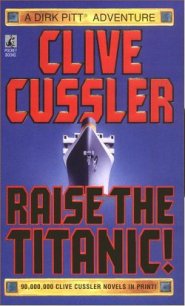The Tombs - Cussler Clive (книги серии онлайн txt) 📗
“I’m certainly glad we did,” said Sam. “We plan to ask the Ministry to take physical custody of what we find this time too.”
“Excellent,” he said. “We’ll be prepared to transport any finds to a space in Il Museo Archeologico Nazionale di Napoli right away.”
“Will you be coming down in the catacomb with us?”
“Yes. I and two other men will join you. I will also have three men at the entrance with trucks, a radio link with the Rome police, and a first-aid station.”
“Thank you,” said Sam. “Can you be ready to go in on Tuesday?”
“We could go tomorrow.”
“Tuesday will be fine,” Sam said. “What time do you think we should start?”
“Four a.m. would be good. The traffic in Rome became impossible the day Caesar was assassinated,” said Boiardi. “We’re waiting for it to clear.”

BENEATH ROME
AT FOUR A.M. TUESDAY, THE MEMBERS OF THE EXPEDITION gathered inside the walls of the Catacomb of Domitilla at 282 Via delle Sette Chiese. It was not yet light out, but a representative of the Divine Word Missionaries named Brother Paolo was there to admit them. He wore the brown robe of a monk, but his bespectacled face seemed more like that of a businessman than a monk, and his socks and shoes were like those someone might wear going to an office. The total effect was like a man caught in his bathrobe before leaving for work.
They followed him down a set of narrow steps to the front doors of a fourth-century church. Only the roof and a single row of windows were visible above ground level, and the interior of the church seemed very old. It was bare, more a relic now than a place of worship. The group brought their gear down into it, and Brother Paolo showed them its three naves, then pointed out the doorway that led to the catacomb and sent them on their way.
It took the explorers about a half hour to get their carts down the first three sets of stone steps to the level where they were to begin their search and then to fill it with their equipment and supplies, which was in backpacks. In the days of preparation, the quantity of these items had been gradually pared down to the essentials—light, photographic gear, tools, water, and food. Now each of the explorers strapped a light to the forehead with an elastic strap.
As they made their way through the first tunnels, what they saw were empty shelves, a few small Roman frescoes plastered and painted over stone or brick, a few empty rooms built as crypts. There were shrines, chambers that were painted, but most of the burial places were unadorned, shiny tufa stone. As they went on, they saw more and more spaces that were still occupied. Now there were large stones to seal the tomb niches. Albrecht began to deliver lessons. “In this section we can relax a bit. The tombs are from the period around 550 to 600 C.E., long after Attila was buried. He can’t be in a tunnel that hadn’t been dug when he died. We want the sections with tombs that were dug before the year 453. You will notice that none of the seal stones gives the date as a number. During that era, the Romans used the Julian calendar, which began in 45 B.C.E. Years were not numbered. Instead they were given the names of the two consuls who took office on January first. The year Attila died, the consuls were Flavius Opilio and Johannes Vincomalus. Remember those names. Attila was still encamped at his stronghold by the Tisza River when he died, meaning it was too early in the year to go off to war. That means he probably died in Januarius, Februarius, or Martius.”
Remi said, “Will it give his name?”
“Almost certainly not, unless it’s disguised in some way. He was cunning, clever. He would not want a Roman to find his tomb. But I think he wanted it to be found some day.”
“Certainly he gave us all the clues,” said Remi.
“He made us work backward, from his most recent treasure to his very first. I believe he wanted a Hun to find the treasures and then use the wealth to do something in the world—but first to conquer it. Perhaps he wanted a descendant to find it. Apparently none of his three sons was up to the task of ruling the world and he undoubtedly knew it.”
“Now that we’re here, I feel as though I must have missed something along the way, some way of distinguishing his tombstone from the others,” Remi said.
“Finding the tomb is part of his test too. We’ll use what we’ve got—date and age—and see what else there is. The catacomb was used between the second and the seventh centuries. His will be somewhere in the earlier ones. And I’m guessing that there will be something that outsiders wouldn’t recognize—maybe a linguistic signal, something that’s not in Latin.”
“I hope he didn’t make it too hard for us non-Huns.”
“I have faith that he didn’t. Think about what you and Sam have just been through. He’s been teaching you about himself. He’s been forcing you to go and stand in each of the places where his life was changed. He’s taken you from the final days, when he was at the height of his power, marrying the beautiful Gothic princess Ildico in his stronghold on the Hungarian Plain surrounded by his hundreds of thousands of fanatical followers, all the way back to the very first moment of his career. Now we know that the start wasn’t a triumph. It was the moment when an orphaned twelve-year-old stood in his father’s grave, about to be sent away as a hostage. And what he did was vow to conquer Rome and be buried here.”
“But he didn’t conquer Rome.”
“He reached the point where it was in his power to do that but chose instead to preserve his overpowering army for another day.”
“And he died before he could come back.”
“True,” said Albrecht. “His death was a complete surprise to everyone. During the long period while he was burying his hoards of pillaged treasure and leaving messages, I’m sure there was never a doubt in his mind that he would take Rome and declare himself emperor. When he turned back at the Po River in 452, he was aware that there was nobody left who could stop him. Flavius Aetius, who had prevented him from extending his kingdom to the Atlantic coast, no longer had an army that could stand against him. It turned out that Aetius’s nominal victory at Chalons-en-Champagne was the last victory by any Western Roman army anywhere, and I believe Attila was astute enough to see it that way. I think that in 453, in late spring or early summer when campaigning season began, he would have gone back to attack Rome. Instead he died.”
They walked along the dark catacomb, the lights from their foreheads the only illumination except when one of them shone a flashlight on an inscription or there was a flash when someone took a picture. From the rear of the group Sam called out, “Keep reading every seal stone you come to. Take pictures to help record our route.”
They walked on, along gallery after gallery. At one point, Tibor and Janos turned to look at an offshoot of the corridor they were in, then scurried to rejoin the group as the light moved on ahead.
Sam stopped and whispered to them. “Did you hear something too?”
Tibor said, “It sounded like footsteps somewhere in the dark behind us. You heard it?”
Remi said, “You think that Attila’s men came down here and took over an earlier burial?”
“Exactly,” said Albrecht. “We think they found a tunnel, or even a district of the catacomb, that was old enough so nobody ever visited it anymore. Then they probably removed a sealing stone and whatever human remains were behind it. Next they did what some Roman families did—dug much deeper and wider into the stone to make a chamber. They would have made a very small, narrow opening so the tomb looked like the thousands around it. But if the treasure is anything like what we’ve read, the chamber would be much larger than any of the crypts we’ve seen so far.”




